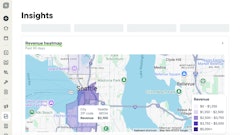
Since its conception, social media has skyrocketed to one of the main ways we communicate. For businesses, social media has become an unmatched tool for connecting with clients and building brand awareness with minimal to no advertising costs.
Social media consists of social networks, platforms and other outlets where users share their interests, news and ideas in conjunction with content creation and media production. Many platforms have niche areas where groups converge to share similar interests and goals.
In 2019, Statista found that more than 70 percent of adults in the U.S. use at least one social media platform. As of 2021, Backlinko found that more than 4.48 billion people worldwide are using social media, with the average user on 6.6 platforms monthly. The opportunity for connection between people on socials is continuing to grow as more platforms, in the form of apps, are released, adopted and used, especially since the height of COVID-19 when people were unable to connect face to face.
The green industry has a thriving section of the web on social media. Green Industry Pros has found a growing community on platforms like Instagram, Twitter and Facebook, and a rising number of connections on LinkedIn. So how can companies leverage social media, and why does it matter?
Pick the right places
According to Backlinko, Facebook is the leading social network at 2.9 billion monthly active users. It’s safe to say that Facebook may be the most recognizable and universally adopted platform on the web today, but that doesn’t necessarily make it the most important. As trends in socials ebb and flow, popularity in platforms often spikes when something new comes on the market.
For example, TikTok, released in 2018, has blown up as users, content creators and businesses find use amid its quick form videos and simple searching hashtags. In September 2021, TikTok hit 1 billion active global users at record speed due to the pandemic. Could this be a place for your business? If you like making short form videos, it could be. For longer content like commercials and video podcasts, YouTube is your best bet. TikTok is unique in that its algorithm is hit or miss. It’s extremely possible for one video, out of hundreds you post, to gain traction and go “viral” overnight, with zero promotion.
On the flipside, Facebook is often used by businesses in the same way a website is. Through the business suite, which also connects to Instagram (owned by Meta, Facebook’s parent company), users can set up a full business page complete with phone numbers, web links, addresses and more. Quicker than with a website-housed blog, users can share information on closings and delays or highlight new products and company changes, all while connecting with clients through comments, likes and messages. It's the “one-stop shop” as far as social media goes, and that’s why it’s often the first one taken advantage of by businesses.
Instagram and Twitter are much more nuanced. Instagram is a quick scroll of pictures that catch the eye—if you’re highlighting a product or project, it’s great for this. The connection between Facebook and Instagram makes it easy to cross-post without an added integrated software solution. Because Instagram doesn’t allow users to link directly to sites in a post, there are additional free hosting sites, such as LinkTree, that give one central, easy mobile spot for links. Twitter, like Facebook, is a sharing of words—but at a capped character length of 280, which can be limiting. One special thing about Twitter is that it uses hashtags to tag tweets to a specific topic, and those tweets can be found by virtually anyone; therefore, the potential for business-to-business connection is huge, specifically from smaller businesses to larger corporations that may “retweet” something they find pertinent, useful or interesting.
LinkedIn is truly the Facebook of business. It is a platform for professionals and companies to market themselves to other professionals and companies. Most people share thoughts and ideas from a business perspective, and that creates a unique space to brand yourself. Connecting on this platform, like Twitter, is very vast and can put users face to face with big names in the industry. Those connections can be garnered at any time and are a great tool to make an e-Rolodex of sorts.
Having a presence on all these major platforms can enhance your business. They are all free, easy to use and can make your business seem full scale even if it’s small. When you have a host of profiles like this and link them on your website, it creates a polished, inter-connected brand image. Additionally, social media can act as a free marketing and advertising tool that is often as simple as typing something out, snapping a quick picture and hitting send. But be wise—business platforms should remain business related and not feature personal content, unless marketing yourself as an expert through your personal LinkedIn profile. Otherwise, mixing your personal and business pages can often deter clients and potential connections. Maintaining a fine line between business content and relatable lighthearted posts is key to building a brand image that feels personal without getting personal.
Why social media matters
The boom of social networking has proven to be a permanent fixture in our lives today. In just six years, social media use has seen an increase in users of 115.59 percent, according to Backlinko. Renolon estimates that approximately 30.57 million businesses in the U.S. alone are on these platforms, making it easy to see why a presence is not just useful but may be necessary for the growth of your company’s future, or your professional future in the industry.
Additionally, Renolon found that of those businesses using social media, 59 percent say it’s mostly for customer service and communications, 44 percent use it for brand awareness and 41 percent say they use social media to drive revenue. The multiuse of social networking can act as the backbone to your business by garnering customers, feedback and revenue.
“It’s evident that social media is an important tool for small businesses. Not only can it help you connect with more customers, but it can also help you learn more about your customers and what they want from your business,” reports Renolon.
One of the beautiful things about social media is that anyone can use it. With social media, business and customers alike have the same chance to share content on any given platform, for free. The awareness that comes with this kind of reach is vast, and the specialized yet diverse offerings in the rental industry give way to unique strategies in which social media can be leveraged and conquered.


















![Gravely Pro Turn Mach One My23 Dsc03139 Edit 1200x800 5b2df79[1]](https://img.greenindustrypros.com/mindful/acbm/workspaces/default/uploads/2025/10/gravely-pro-turn-mach-one-my23-dsc03139-edit-1200x800-5b2df791.BucBnDoN22.jpg?ar=16%3A9&auto=format%2Ccompress&fit=crop&h=135&q=70&w=240)

